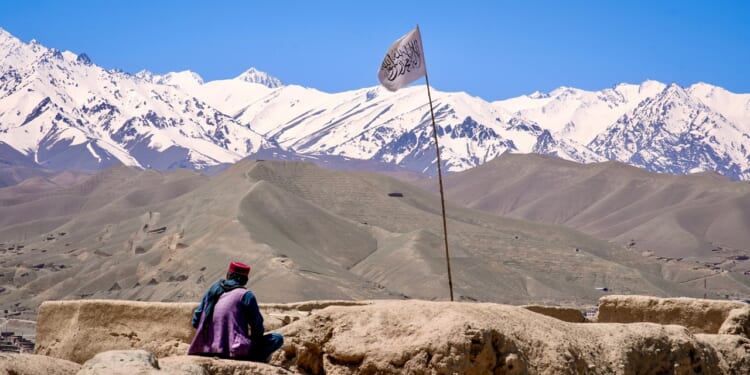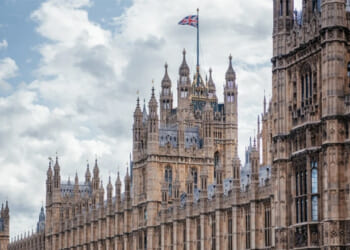The Taliban will need American help to end a conflict that would surely destroy their hold on power. There is only one thing they could offer America in return.
A bizarre conflict has erupted in the ancient, dusty foothills of South Asia—a border clash between Pakistan and Taliban-controlled Afghanistan. Officially, Pakistan claims that it initiated the conflict due to the Taliban’s harboring of terrorist groups, such as Tehrik-e-Taliban Pakistan (TTP).
Islamabad claims there have been multiple unprovoked attacks from Afghan-territory border posts or by militants crossing from the Afghan side, firing on Pakistani posts or security forces. The Pakistani leadership frames its airstrikes and responses as defensive or retaliatory.
Even with news that a temporary ceasefire has been declared between the two sides, in lieu of a more permanent one, the prospects that the two nations will resume fighting are high. This gives a real opportunity for the Trump administration to throw its diplomatic weight around to achieve its own goals for the region: restoring Bagram Air Base to US control.
A Taliban-Pakistan War Is on the Horizon
The Pakistani attacks have given the Taliban an opportunity to deploy the arsenal of weapons that the United States left behind for them in the wake of former President Joe Biden’s humiliating retreat from Afghanistan in 2021. We are about to see if the Taliban are even capable of operating many of the advanced heavy weapons that the Americans inauspiciously left behind for the Taliban to find.
Pakistan’s government says that the strikes are intended to pressure the otherwise recalcitrant Taliban to act against these anti-Pakistani militant groups who’ve found safe harbor within the borders of Afghanistan. But perhaps there’s something more.
In recent weeks, President Donald Trump has made mention of his interest to restore Bagram Air Base, once the nexus of all US military and covert operations in Afghanistan, back to American control. Trump’s vision would see the Americans placing a small force inside Bagram and conducting counterterrorism missions against Islamist groups operating inside Afghanistan.
The Taliban have politely entertained Trump’s ruminations on the matter. But most experts believed that Kabul would never consent to it, because of the implications of having a US military presence in their borders after only having gotten rid of that force four short years ago.
Things have changed, however, as Pakistan pummels Afghanistan.
The Taliban Will Need Trump’s Help Against Pakistan
Now, the Taliban might need American help to end a conflict that would surely destroy their hold on power, irrespective of whatever American weapons they have acquired in the wake of the US military’s embarrassing withdrawal from the country. After all, the Pakistani leadership has a real love for Trump—especially after he successfully ended the Indo-Pakistan War that erupted in May of this year.
Plus, contrary to the wishes of Pakistan’s other major benefactor on the world stage, China, Islamabad badly wants to sell its newfound sources of rare earth mineral deposits, as well as its natural gas and oil sources, to the hungry Americans.
Trump might be playing the Taliban. He wants Bagram back. They don’t want to cede that over to the Americans, no matter how small of a military presence Trump envisions being stationed there. Similarly, the Pakistanis want badly to ingratiate themselves with Trump. So Pakistan opening an Afghanistan front might very well be a feint designed to indirectly pressure the Taliban into better complying with Trump’s wishes.
What Does Pakistan Want from Trump?
As for Pakistan, its motives are clear. Pakistani leaders fear strategic encirclement by the Indians. What’s more, while Islamabad has enjoyed their tight relationship with China, Islamabad does not want to be overly dependent on any one nation for its survival. When the Americans were present in Afghanistan, Washington poured resources and time into Pakistan in order to stabilize it and give it greater control over its own frontier with Afghanistan. Washington (and the entire NATO mission) relied on a long logistics chain into and out of landlocked Afghanistan to sustain the US mission in Afghanistan.
Part of that supply chain ran through Pakistan—from which Pakistan benefited greatly. Since the Americans pulled out of Afghanistan, however, the Pakistani economy has taken a hit. While Trump wants a very small contingent of US forces returning to Bagram, it is likely that Pakistan would once again play a role in the logistics chain linking that airbase with the wider world. Plus, having US forces present in Afghanistan denies India maneuvering room into Afghanistan.
It also compels Beijing to play nicer with Pakistan, out of fear that China might lose Pakistan to the returning Americans.
Trump thinks an American presence in Bagram would also allow for unprecedented surveillance of western China. He’s right about that. Then again, putting Americans—especially a very small contingent—in isolated Afghanistan that is still run by the Taliban could be a recipe for disaster. After all, even if the Taliban themselves respected the sovereignty of any US mission at Bagram, any number of other anti-American factions crawling in the country’s hinterlands—Al Qaeda, ISIS-K, or even the transnational criminal Haqqani Network—might not.
So the allure of having clear line-of-sight into neighboring China, while intoxicating, is probably not worth the risk or the money of restoring US control over Bagram. But Trump wants it. So, barring something significant from blocking that desire, it is likely that Pakistan’s attack on Afghanistan is a ploy to get US troops permanently stationed in Afghanistan once more.
About the Author: Brandon J. Weichert
Brandon J. Weichert is a senior national security editor at The National Interest. Recently, Weichert became the host of The National Security Hour on America Outloud News and iHeartRadio, where he discusses national security policy every Wednesday at 8pm Eastern. He is also a contributor at Popular Mechanics and has consulted regularly with various government institutions and private organizations on geopolitical issues. Weichert’s writings have appeared in multiple publications, including The Washington Times, National Review, The American Spectator, MSN, The Asia Times, and others. His books include Winning Space: How America Remains a Superpower, Biohacked: China’s Race to Control Life, and The Shadow War: Iran’s Quest for Supremacy. His newest book, A Disaster of Our Own Making: How the West Lost Ukraine is available for purchase wherever books are sold. He can be followed via Twitter @WeTheBrandon.
Image: Shutterstock / eyetravelphotos.

















